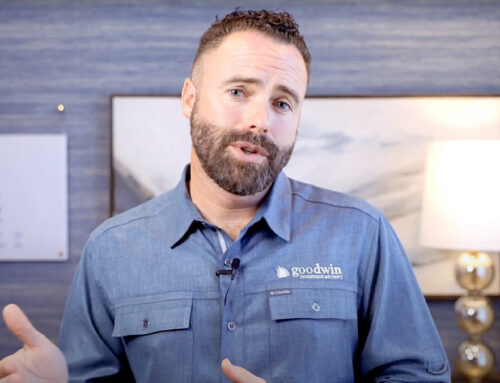
Retiring is an exciting milestone, but it comes with unique challenges, especially when it comes to tax planning. At Goodwin Investment Advisory, we specialize in simplifying the process, partnering with you and your CPA to ensure your financial plan is tax-efficient and aligned with your long-term goals.
Here are 10 pro tips and actionable steps for navigating early retirement with clarity and confidence.
1. Understand how your financial resources are taxed
Retirees often rely on multiple income sources, such as Social Security, retirement accounts (pre-tax and Roth), dividends, interest, and investment gains. Each is taxed differently—some at ordinary income rates, others at capital gains rates, or even tax-free.
quick win: Identify all your income sources and how they are taxed. This knowledge will help you optimize your withdrawal strategy. In other words, how much should be withdrawn from each account type?
2. Take advantage of lower tax brackets
Early retirement often means lower taxable income, creating opportunities to reduce your lifetime tax liability. This is the perfect time to consider strategically converting pre-tax assets such as a traditional IRA to a Roth IRA.
quick win: If you’re in a low tax bracket, consider converting some of your traditional IRA funds to a Roth IRA.
get help planning Roth IRA conversions
Roth IRA conversions allow you to pay taxes on your retirement savings now, potentially at a lower rate, while benefiting from tax-free withdrawals later. By spreading conversions over several years, you can minimize the tax impact while building a tax-free income source for the future.
Q: How much should I convert each year?
- Work with an advisor to determine how much to convert without pushing yourself into a higher tax bracket.
A good question to ask is, “Does it help me exclude my future Social Security from being taxed?” This strategy can potentially help you avoid the Social Security Tax Torpedo by reducing your Provisional Income (non-Social Security income that is taxable), in future years. While future tax rates could fluctuate, Roth conversions may help ensure that less—or none—of your Social Security benefits are subject to taxation in subsequent years. Work with an advisor with expertise in this area to see if Roth conversions could be beneficial to you.
3. Manage Social Security timing
Delaying Social Security benefits can significantly increase your monthly payout, but starting earlier may better suit your financial plan and either decision can significantly impact your lifetime tax liability.
Q: Is Social Security taxable?
- Yes, up to 85% of your benefits may be taxable, depending on your income level.
quick win: Use a Social Security calculator or consult with an advisor to determine the optimal timing based on your unique situation.
The decision to start Social Security benefits early varies for each individual and depends on your overall retirement plan and goals.
It’s essential to have an advisor review your holistic financial picture to make an informed choice. For couples, the spouse with the higher benefit should carefully consider whether to take benefits early, factoring in the couple’s joint life expectancy. If the higher-earning spouse passes away first, starting benefits early could result in a lower survivor benefit for the surviving spouse, particularly if they live a long time.
4. Plan for Required Minimum Distributions (RMDs)
RMDs start at age 73, or 75 depending on the year you were born. Retirees should plan for them now to avoid higher taxes later.
Q: How can I reduce the tax impact of RMDs?
- Consider Roth conversions or Qualified Charitable Distributions (QCDs). Roth conversions lower future RMDs, and QCDs exclude RMDs from taxable income.
5. Avoid early withdrawal penalties
If you’re under 59½, accessing funds from retirement accounts without triggering penalties can be tricky.
Q: How can I access my retirement accounts before 59½ without penalties?
- Consider using strategies like 457 plans for government workers and teachers, HSAs, Substantially Equal Periodic Payments (SEPPs), withdrawing from a Roth IRA basis, or tapping taxable accounts first.
- The age 55 rule is a provision under IRS regulations that allows certain early withdrawals from qualified retirement plans (such as 401(k)s or 403(b)s) without incurring the standard 10% early withdrawal penalty. The age 55 rule provides flexibility for individuals who retire early or experience an unexpected job change, allowing them to access retirement funds penalty-free to bridge the gap until they qualify for penalty-free distributions at age 59½.
Q: What are SEPPs, and how do they work?
- According to the Internal Revenue Service, SEPPs allow individuals to make penalty-free withdrawals from their retirement accounts before age 59½. To avoid the 10% early distribution penalty, these fixed distributions must continue for the longer of five years or until the individual reaches age 59½.
6. Use tax-loss harvesting
Tax-loss harvesting allows you to offset realized capital gains by selling underperforming investments at a loss.
Q: When should I consider tax-loss harvesting?
- Typically, during market downturns or when rebalancing your portfolio.
quick win: Review your portfolio for potential losses to harvest during market downturns. This strategy has the biggest impact when offsetting capital gains realized in the same year, reducing your tax bill while rebalancing your investments.
7. Be strategic with Capital Gains
The 0% capital gains tax rate for lower-income brackets is a valuable opportunity for retirees.
Q: What is the 0% capital gains tax bracket?
- If your income is below certain thresholds, you may qualify to pay 0% on long-term capital gains.
Q: How can I manage capital gains tax rates?
- Limit ordinary income from other sources, such as withdrawals from pre-tax accounts.
quick win: Work with an advisor to plan the timing of sales from taxable accounts to stay within the 0% or 15% capital gains tax thresholds.
8. Manage healthcare costs and taxes
Before qualifying for Medicare at age 65, early retirees often rely on Affordable Care Act (ACA) plans, where premium subsidies are income-dependent and not based on net worth.
Q: How can I lower healthcare costs before Medicare?
- Keep taxable income low to qualify for ACA subsidies by optimizing your withdrawal strategy using accounts like Roth IRAs, HSAs, and brokerage accounts.
9. Optimize Your Portfolio with tax-efficient investments
Having a mix of taxable, tax-deferred, and tax-free accounts provides flexibility to manage taxes throughout retirement.
Q: How do I know if my portfolio is tax-diversified enough?
- An advisor can review your accounts and recommend adjustments to prepare for a tax-efficient retirement.
quick win: Review your portfolio with an advisor to ensure it includes a balance of account types that align with your long-term strategy.
10. Work with a trusted advisor and CPA
Tax planning can be complex, but you don’t have to navigate it alone. A trusted advisor works with your CPA to create a cohesive plan that minimizes taxes and maximizes your financial security.
Q: How can an advisor help me with tax planning?
- Advisors ensure your financial plan is tax-efficient, working alongside your CPA to align all elements of your strategy.
Q: Why involve both an advisor and a CPA?
- Advisors focus on strategy and long-term planning, while CPAs handle immediate tax preparation. Together, they provide a comprehensive approach.
quick win: Schedule a call with our team to review your financial plan, discuss tax strategies, and collaborate with your CPA to make the most of your retirement.
Simplifying tax planning for retirement
Retiring is more than just financial freedom—it’s about creating a plan that works for you now and in the future. Taxes play a critical role in your retirement success, and proactive planning can help you optimize your income, minimize your taxes, and preserve your wealth.
At Goodwin Investment Advisory, we specialize in guiding families through the complexities of tax planning and financial management.
Schedule Your Intro Call Today to start your journey toward financial peace and independence. Let’s make retiring as simple and stress-free as possible!
To download the tax pro tips checklist click here.









